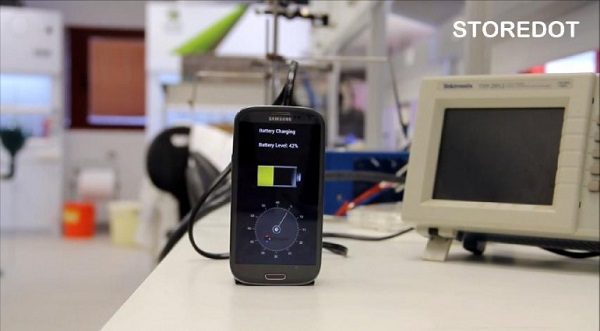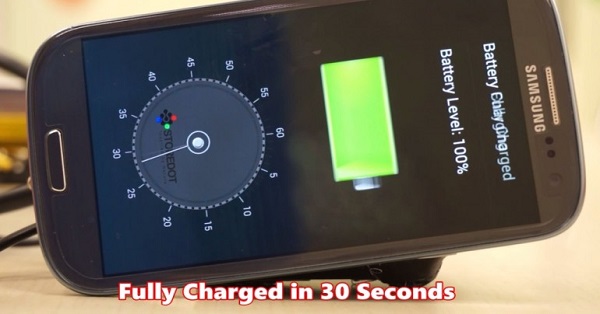With each passing year smartphones get more processing power, are capable of running more apps at a time and come with hardware features that get better and better, yet the capacity of the batteries seems to stagnate.
At Microsoft’s Think Next symposium in Tel Aviv, Israeli startup StoreDot proved that the capacity of the battery is not the only thing that could enable us to use our smartphones and tablets longer. The nanodot-based smartphone battery that StoreDot demoed at Microsoft’s event is a an incredible alternative to high-capacity batteries, as it only needs 30 seconds to recharge.

In an interview with Gizmag, StoreDot CEO Doron Myersdorf explained how the battery’s components interact with each other: “In essence, we have developed a new generation of electrodes with new materials – we call it MFE – Multi Function Electrode. On one side it acts like a supercapacitor (with very fast charging), and on the other is like a lithium electrode (with slow discharge). The electrolyte is modified with our nanodots in order to make the multifunction electrode more effective.”
The nanodots that Myersdorf mentioned are in fact chemically synthesized bio-organic peptide molecules that improve the capacitance of electrodes and the performance of electrolytes, which in the end result in faster charging times. StoreDot is by no means the inventor of nanodots. However, in the past this technology involved toxic heavy metals, so this Israeli company’s approach is a lot safer.

The best news about the technology involved in this battery? StoreDot is considering mass production, so we might get to see such batteries powering our gadgets in the not-so-distant future. In fact, the Israeli startup is looking to patent this technology and if everything goes well, nanodot-based batteries should hit the market in late 2016. That might seem like a long time, but considering for how long we’ve used regular batteries, a couple of years will pass in a flash.
More importantly, StoreDot is looking to revolutionize electric vehicles, as well, with its innovative technology. If anything, the ability to recharge an electric car in just a few minutes would make this type of vehicles a lot more attractive and efficient for long trips across countries and even continents. Of course, some adjustments should be made, in order to accommodate the higher currents and the greater number of cells found in EV batteries.
Be social! Follow Walyou on Facebook and Twitter, and read more related stories about daisy-chained solar panels that charge batteries faster and the replacement of Duracell and Energizer batteries by USB gadgets.










